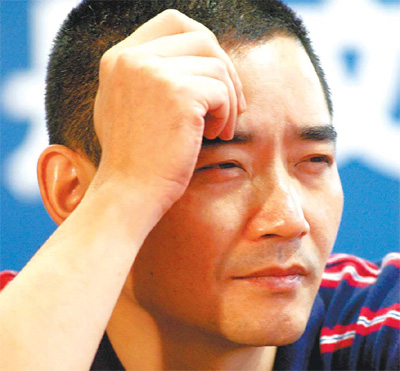Su Tong's redemption pays off
 In the 1980s Su studied literature at Beijing Normal University, at a time when writers were seen as heroes. His first novelette was published in 1983, but it wasn't until four years later that his literary career took off. Su wrote about a mulberry garden, based on his early memories, but the draft was turned down by a number of publishers until an editor went to the restroom with a pile of papers to pass the time and spotted his talent.
In the 1980s Su studied literature at Beijing Normal University, at a time when writers were seen as heroes. His first novelette was published in 1983, but it wasn't until four years later that his literary career took off. Su wrote about a mulberry garden, based on his early memories, but the draft was turned down by a number of publishers until an editor went to the restroom with a pile of papers to pass the time and spotted his talent.
"It was only 5,000 words, but it was a very bright spot. I discovered only then that novel-writing can be relevant to the heart and soul," Su said.
Su was concerned that his passion for literature would dim with age and promised himself that he would fulfill his dream of writing about the river before he turned 40.
However, it wasn't until three years ago when he took his daughter to visit their old home in Suzhou that he was inspired to start writing. They stood on a bridge littered with rubbish and a fleet of barges sailed by. "I hadn't seen the barges for years. When they went by my mind suddenly lit up. I realized that the story of the river should take place on a boat."
Though he has never lived on a boat and now lives in Nanjing, capital of Jiangsu, Su is fascinated by boat life, its colorful and earthy expressions. Su depicts sailors as more lenient and uninhibited than bank dwellers.
"What makes the novel different is that for the first time, I was on a mission to address a specific historical period," Su said.
Su often compares his memories to a box of jewelry, in which lies a bullet. This was inspired by his frightened mother picking up the then 3-year-old Su and taking him to another room when a bullet hit the family's door, close to where Su was sleeping.
Su later learned that in the chaotic period leading up to the "cultural revolution," an armed mob had seized a tower across the river and was shooting from it randomly.
"This is my first memory, a memory about society and life, a memory that hints at my future in literature," Su said.
When questioned about the violence in his works, Su said he often asks himself the same question. But he argues that what matters is how people deal with the violent legacy of bygone times.
"I won't write a novel based on violence. But when I try to capture the bloody smell of iron typical of that time, I shall never avoid it," said Su, whose works have been translated into many languages, since Zhang Yimou turned his novel "Wives and Concubines into Raise the Red Lantern," which won the Silver Lion for Best Director at Venice Film Festival in 1991.
Known as a writer who deals sympathetically with women and their feelings, in his latest novel Su shifts to a wider spectrum of society, though the portrayal of Ku Wenxuan's tragic wife is still memorable.
 0 Comments
0 Comments







Comments